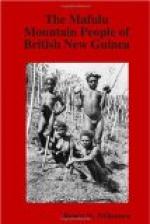No woman can possess any property, other than movable property, and even this is at best confined to the clothes and ornaments which she wears. On the death of a married woman all her effects go to her husband, or, if he be dead, they go to her children or descendants, male and female, equally, If she has no children or descendants, they go to her husband’s father, or, failing him, to such other person or persons as would have been entitled to inherit if her effects had been those of her husband. Her own blood relations do not come in, as she had been bought and paid for by her husband. If the deceased woman were a spinster, then her effects would pass to her father, or, failing him, to her brothers, or, failing them, to her nearest male relatives on her father’s side.
The guardianship of and responsibility for infant children whose father dies falls primarily upon the children’s mother, and she, if and when she returned to her own people, would probably take the children away with her, though her sons, who shared in the inheritance from their father, would usually come back again to their own village when they became grown up, and might do so even when comparatively young. If there is no mother of the children, the guardianship and responsibility is taken up by one or more of the relatives of either the deceased father or deceased mother of the children, and it might be that some children would be taken over by some of such relatives, and some by others. There appears, however, to be no regular rule as to all this, the question being largely one of convenience.
Adopted children have in all matters of inheritance the same rights as actual children.
From the above particulars it will be seen that there is no system of descent in the female line or of mother-right among the Mafulu, and I could not find any trace of such a thing having ever existed with them. As to this I would draw attention to the facts that the mother’s relatives do not come in specially, as they do among the Roro and Mekeo people, in connection with the perineal band ceremony; that a boy owes no service to his maternal uncle, as is the case among the Koita; that there is no equivalent of the Koita Heni ceremony; that in no case can a woman be a chief, or chieftainship descend by the female line; that children belong to the clan of their father, and not to that of their mother; and that no duty or responsibility for orphan children devolves specially upon their mother’s relations.
CHAPTER VIII
The Big Feast
This is the greatest and most important social function of a Mafulu community of villages. I was unable to get any information as to its real intent and origin, but a clue to this may, I think, be found in the formal cutting down of the grave platform of a chief, the dipping of chiefs’ bones in the blood of the slain pigs, and the touching of other chiefs’ bones with the bones so dipped, which constitute such important features of the function, and which perhaps point to an idea of in some way finally propitiating or driving away or “laying” the ghosts of the chiefs whose bones are the subject of the ceremony.




